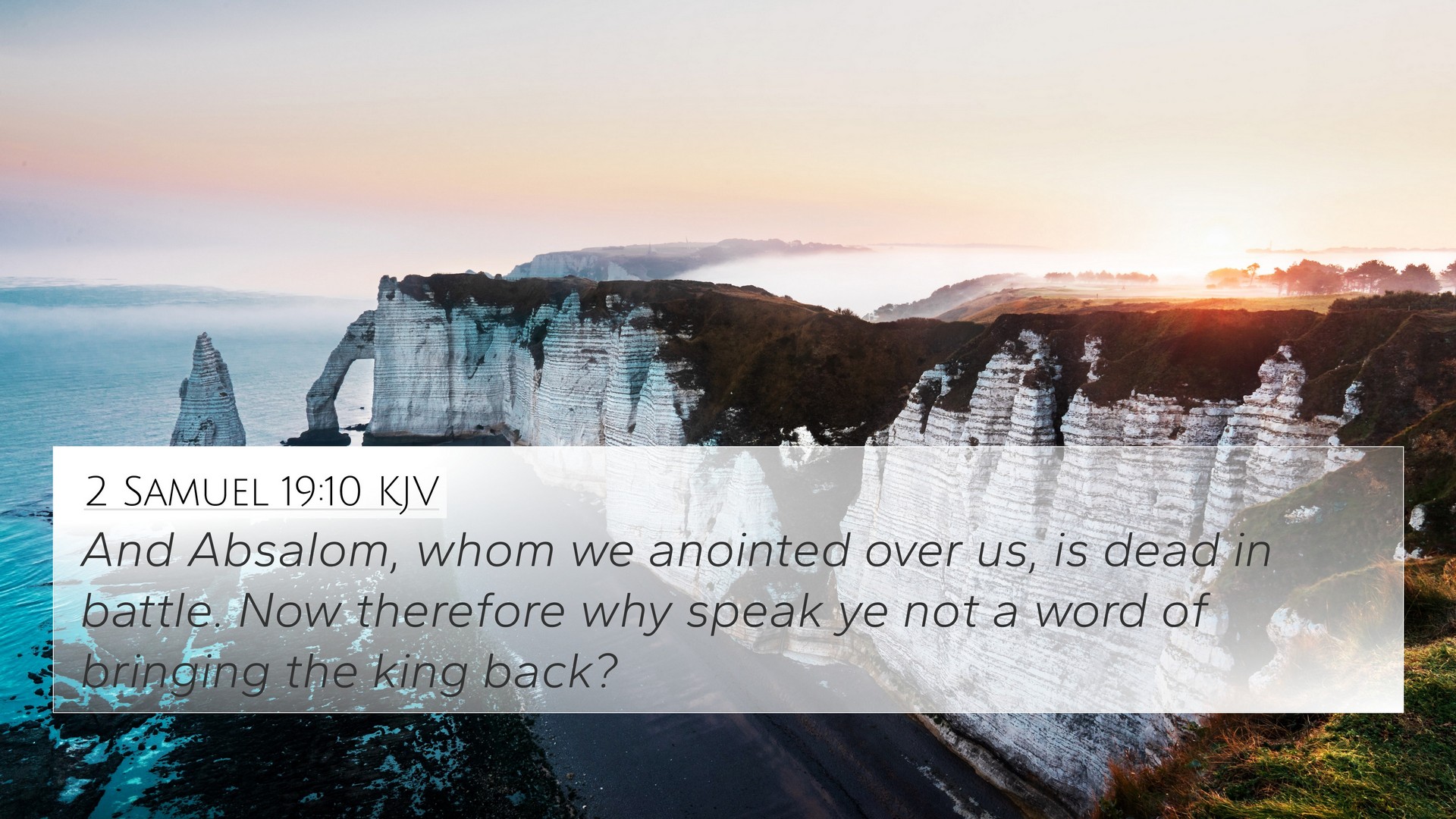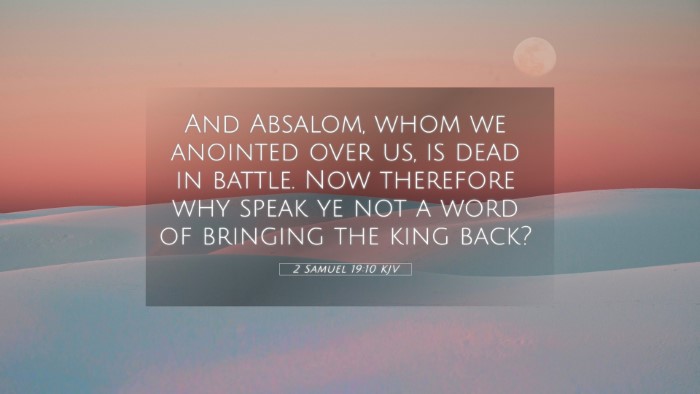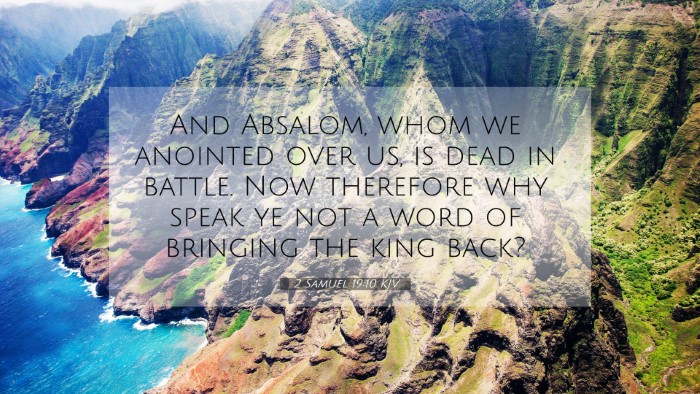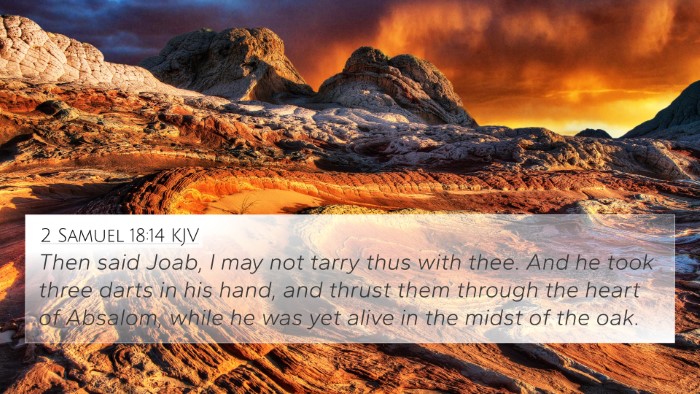Understanding 2 Samuel 19:10
Verse: 2 Samuel 19:10 - "And Absalom, whom we anointed over us, is dead in battle. Now therefore, why do you hold back from bringing the king back?"
Verse Meaning Summary
The verse depicts a crucial moment in Israel's history following the rebellion of Absalom against his father, King David. This rebellion results in a civil war, and the news of Absalom's death leads to pivotal decisions regarding the restoration of David as king. The implications are profound, as it signifies the end of a tumultuous chapter for the nation of Israel and highlights themes of loyalty, authority, and the consequences of rebellion.
Insights from Public Domain Commentaries
Matthew Henry's Commentary
Matthew Henry emphasizes the significance of the verse in understanding the political dynamics during Absalom's rebellion. He notes that after Absalom's death, the hearts of the people were turned back to David, illustrating the importance of godly leadership. Henry suggests that the people’s recognition of David's kingship reflects their need for stability and guidance, as Absalom's ambitious pursuit only led to destruction.
Albert Barnes' Notes on the Bible
Albert Barnes highlights the feelings of regret among the Israelites for having supported Absalom against David. He points out that the verse serves as a reminder of the fleeting nature of power and the consequences of rebellion against divinely appointed authority. Barnes interprets the question posed in the verse as a call to action for the people to restore the rightful king, emphasizing the theme of repenting from poor choices and righting past wrongs.
Adam Clarke's Commentary
Adam Clarke delves into the emotional turmoil surrounding Absalom’s death. He notes that the people’s initial support for Absalom is contrasted starkly with their current sorrow and desire for David's return. Clarke often draws upon historical context, illustrating how the verse not only speaks to the immediate situation but also conveys broader themes of redemption and the intricate relationships between leaders and their people.
Thematic Connections
This verse encapsulates several themes prominent in the Bible, such as:
- The consequences of rebellion: Absalom's death serves as a reminder that rebellion against God's appointed leader results in grave consequences.
- The return of a rightful king: David's restoration signifies hope and renewal for the Israelite people.
- The nature of leadership: The shift in allegiance from Absalom to David illustrates the people's yearning for righteous governance.
- Emotional complexity: The anguish surrounding Absalom’s demise highlights the painful realities of familial conflict and betrayal.
Cross-References for Further Study
This verse connects with several other scripture passages that enhance understanding. Notable cross-references include:
- 2 Samuel 15:1-6: Absalom's conspiracy against David.
- 2 Samuel 18:33: David's grief upon hearing of Absalom's death.
- 1 Kings 1:5: Another instance of turmoil over leadership succession.
- Psalm 3:1-3: David's lament during Absalom's rebellion.
- 2 Samuel 12:10-12: God's judgment on David regarding his household following his sin with Bathsheba.
- Galatians 6:7: The principle that one reaps what one sows, applicable to the consequences of Absalom’s actions.
- Luke 12:51: Jesus talks about the division that His presence can bring, echoing the conflict within David's house.
Conclusion
2 Samuel 19:10 serves as a critical juncture in the narrative of David's kingship and the history of Israel. By examining this verse through various commentaries and associated scripture, one can discern deeper meanings about authority, the impact of personal decisions, and the intricate tapestry of human relationships as they relate to divine intentions. The lessons gleaned from this scripture continue to resonate, inviting readers to reflect on the nature of loyalty, leadership, and the potential for restoration after periods of turmoil.
Related Bible Study Tools
For further exploration and analysis of Bible verses, consider utilizing:
- Bible concordance
- Bible cross-reference guide
- Cross-reference Bible study methods
- Comprehensive Bible cross-reference materials
- Tools for Bible cross-referencing






